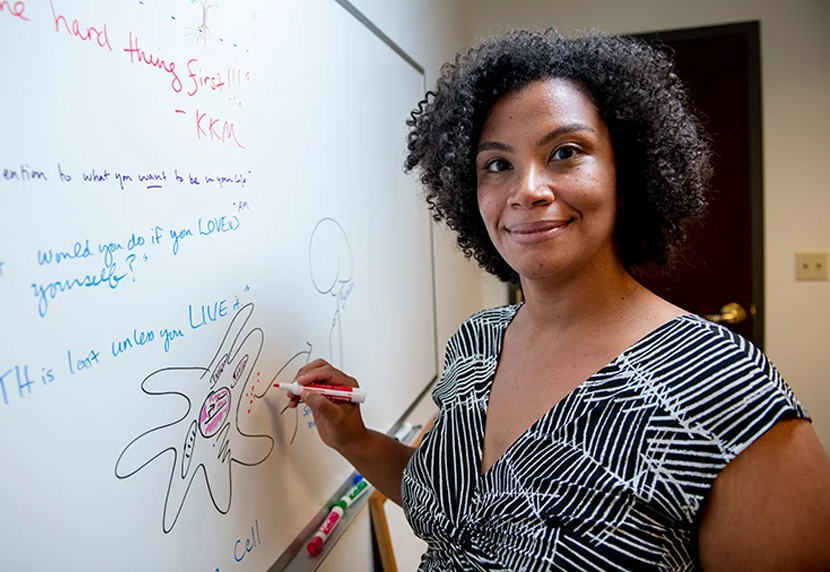September is #NationalRecoveryMonth. This national observance is held to educate Americans that substance use treatment and mental health services can enable those with a substance use disorder to live a healthy and rewarding life. In recognition of National Recovery Month, we spoke with Matt Snyder, MSW, LCSW, a member of Home Base’s social work team, to learn more about what this month is all about and how Home Base is addressing substance use and co-occurring mental health conditions.
“This summer, Home Base launched the SOAR Program, a skills-based, intensive outpatient recovery program …”
“Substance use disorders impact a large population of our veterans, service members, and their families,” said Matt. “This summer, Home Base launched the SOAR Program, a skills-based, intensive outpatient recovery program for substance use and co-occurring mental health conditions, such as post-traumatic stress, anxiety and depression.”
Veterans and service members receive professional support and evidence-based care to help meet their individual recovery goals and needs. Both mental health and substance use concerns are treated at the same time, in the same place, by the same treatment team at Home Base.
Substance Use Disorder Education
As one of the leaders of the SOAR Program, Matt is responsible for working with participants to gain more education around substance use disorders, how they impact the brain, the role they can play in relationships, as well as how to build a life in recovery. Group members attend the program three hours per day, three times per week, for four weeks and participate in both an education and skills group, which provides group members with practical skills to attain their recovery goals.

Part of Matt’s role is also to educate internal staff about how they can play a role in ensuring the care they provide to those impacted by a substance use disorder is delivered in a culturally sensitive, compassionate and respectful manner, fitting the frameworks set forth by the Mass General credo and the Home Base mission.
“A large part of this initiative to deliver quality care in an inclusive way is the language we use associated with substance use disorders,” explained Matt. “The language that we use should be person-first, non-stigmatizing, and encouraging so that veterans, service members, and their families do not feel additional barriers to seeking treatment, which we see all too often in relation to addiction.”
Words that Stigmatize
For example, words like, “alcoholic,” “addict,” “user,” “junkie,” or “drunk” strip away the complexity of someone’s humanity and boils their experience down to one term. An example of a non-stigmatizing substitute would be, “person with a substance use disorder.”
“Using words like ‘clean results’ or ‘dirty results’ relate signs of a substance use disorder with that of filth,” said Matt. “If someone is actively using a substance, this can lead to them internalizing themselves as dirty. Instead, try to use ‘positive results’ or ‘negative results.’” “Research certainly shows us how impactful these types of changes in language can be in influencing how a patient views themselves, how motivated they are to seek treatment, and even the quality of treatment they receive from providers.”

•Boston Marathon Runner Raises Funds for Home Base
• Mass General Gives Toast to its Fundraising Community
Therapy for Loved Ones
In addition to the SOAR Program, members of Home Base’s social work team are also trained in CRAFT – Community Reinforcement and Family Training. This model of therapy assists those who are struggling with a loved one’s substance use.
“We understand that, just like the mental health conditions we see in our veterans and service members like depression or post-traumatic stress, addiction is something that impacts the entire family and support system of an individual,” Matt said. Through the utilization of CRAFT, the clinical team hopes to help the person participating in CRAFT focus on their own well-being while helping them coach their loved one into treatment through skills like positive reinforcement, active listening, and allowing natural consequences to play out.
Home Base, a Red Sox Foundation and Massachusetts General Hospital program, is dedicated to healing the invisible wounds for veterans of all eras, service members, military families and families of the fallen through world-class clinical care, wellness, education and research.
To learn more about how Home Base is addressing substance use and co-occurring mental health conditions, please visit homebase.org/SOARProgram. To speak with someone from the team about getting care at Home Base, please visit homebase.org/connect2care.
To learn more about how you can support Home Base, please contact us.
This story first appeared on the Home Base website.


